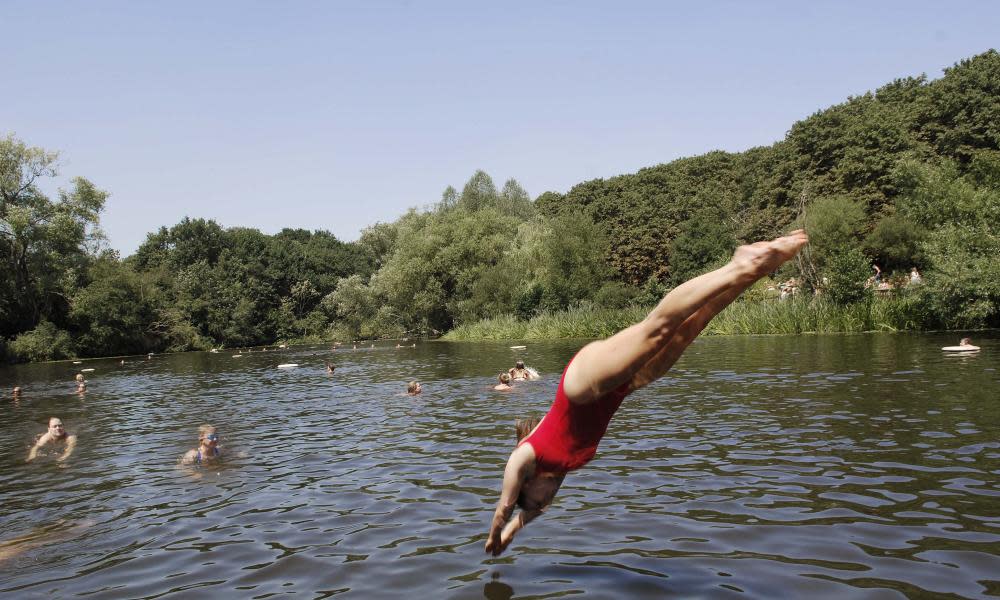Don’t fence in our fun, say wild swimmers

Even in the bleak midwinter, a hardy few can be found bobbing around the dark waters of the Highgate bathing ponds on Hampstead Heath in north London, their faces wreathed in near-beatific smiles.
As the late nature writer Roger Deakin enthused about wild swimming: “I can dive in with a long face, and what feels like a terminal case of depression, and come out a whistling idiot.”
But now regular users of the ponds claim a raft of new charges and health and safety measures proposed by the City of London Corporation threatens not just the unique harmony of the ponds but the nation’s burgeoning enthusiasm for wild swimming by setting an example for other sites.
The corporation insists that it is this enthusiasm that has left it with no choice. Over the past decade, annual visits to the world-famous ponds have increased from 296,000 to more than 655,000. As a result, it is considering access charges, set against a benchmark of other swimming venues such as Hyde Park’s Serpentine, which charges adults £4.80 a session.
Nicky Mayhew, co-chair of the Kenwood Ladies’ Pond Association, said it would be easy to caricature those fighting the corporation as the well-heeled burghers of Hampstead opposed to change. “But the truth is more nuanced. We believe the ponds should be accessible to everybody. We have a wide range of users, and there would be people who would find it prohibitive. We should respect the people who think it should be free. The city should make it easy for the people who are prepared to pay but find it incredibly difficult to do so, to pay or make a contribution.”
Swimmers are currently asked to pay £2 a visit but the charge is all but voluntary, and sensor technology used by the corporation suggests that only 3.7% of pond users pay the charge, which was introduced in 2005. Before that, swimming on the Heath had been free for more than a century. Regular pond swimmers say that the corporation has failed to introduce easy ways to pay, such as contactless payment, and has dragged its heels over replacing broken ticket machines and making it possible to renew season tickets online.
The corporation says it spent £747,000 last year maintaining the ponds, while income from ticket sales and donations totalled just £67,000.

After a drowning in 2019, a coroner and the Health and Safety Executive (HSE) said that the ponds must introduce more lifeguards and crowd management technology before the start of the 2020 swimming season, in May. The corporation sees increased charges as the way to pay for these, but the user groups – who contend that around 10% of swimmers pay – have accused it of seeking to “railroad” the changes through without considering how they will hit the most vulnerable. They believe a campaign to encourage voluntary contributions would be successful in bridging the gap.
Karina Dostalova, chair of the corporation’s Hampstead Heath management committee, said it would continue to subsidise the ponds to make them as affordable as possible but the current financial gap was “not sustainable”. Her committee will be recommending that annual season ticket prices should be frozen at £125 for an adult and £66 for concessions.
“We are all very passionate about ensuring that the ponds are there for everyone to enjoy in the future,” Dostalova said. “That means we need to respond to the HSE because they could close the ponds down if we hadn’t implemented their advice.”
Users worry that, to make the new payment system work, the corporation will introduce mechanical gates, spot checks and fines. “This will completely destroy the atmosphere and the spirit of these places, which are extraordinarily beautiful and life-enhancing,” Mayhew said.
But Dostalova said the measures would make wild swimming on Hampstead Heath more accessible. “I wouldn’t get in if there wasn’t a lifeguard there,” she said. “It’s really important to make it available to everybody, rather than the hardy few.”
Mayhew warned that the row would ripple out far beyond the placid waters of NW3. “If the city is able to enforce charges for what was historically wild swimming on Hampstead Heath, they are going to set a precedent which could be followed elsewhere. With the growth in wild swimming, that is quite sinister. A lot of people who might feel they can control access to swimming spots would possibly see it as a licence to make some money.”

 Yahoo News
Yahoo News 
